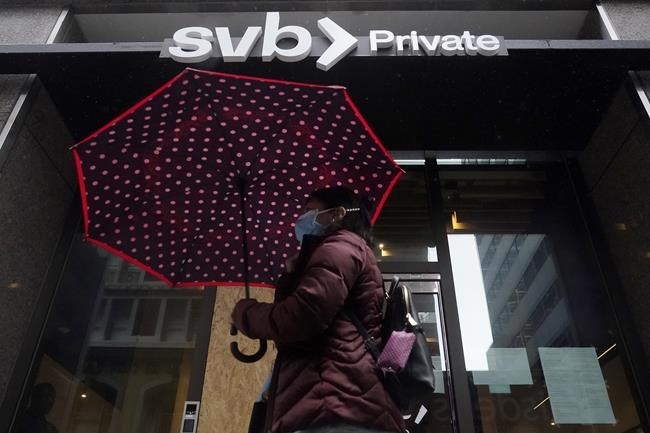TORONTO ŌĆö Members of Canada's technology sector say they're worried the collapse of the Silicon Valley Bank (SVB) will have a chilling effect on investments in the already-hampered sector.
They say some 91įŁ┤┤ startups have been worried about cash flow and many are fretting how theyŌĆÖll raise their next round of funding after U.S. regulators closed the California bank on Friday, when its clients rushed to withdraw billions of dollars as they feared for the organizationŌĆÖs solvency.
U.S. regulators, including the Federal Deposit Insurance Corporation (FDIC), have since announced plans to safeguard the financial system and honour all the bankŌĆÖs deposits. Canada's Office of the Superintendent of Financial Institutions (OSFI) said Sunday that it would seize the bankŌĆÖs 91įŁ┤┤ assets.
But concerns still loom for Canada's tech sector.
ŌĆ£I'm hearing from founders that our fate is in the hands of the FDIC in the U.S. and they're not in a hurry to wire money up to Canada so we can do payrolls for our companies," said Chris Albinson, chief executive at Communitech.
He estimates 10 per cent or 120 of the 1,200 founders his Waterloo, Ont. innovation hub deals with were impacted by the bankŌĆÖs fall. Up until the Sunday announcement from OSFI, several didnŌĆÖt think they could access the cash they needed to pay workers for the week, he said.
ŌĆ£ThereŌĆÖs no questionŌĆØ that even 91įŁ┤┤ companies who didnŌĆÖt bank with SVB will feel the effects of its collapse, especially when fundraising, he added.┬Ā
ŌĆ£We had a company that had a termsheet, was ready to get financed. They didn't have any relationship with SVB. Nor did the venture firm have anything to do with SVB,ŌĆØ Albinson said.
ŌĆ£But because the California-based venture firm was concerned about what else was going to happen, they said, ŌĆśwe're not going to do any new investments. We're just going to focus on our existing companies.ŌĆÖ They pulled the term sheet, and the company sadly, had to layoff half the team.ŌĆØ
The timing couldnŌĆÖt be worse.┬Ā
Tech investments have been under pressure for almost a year as consumers shift back to pre-pandemic habits, forcing companies to rethink growth projections and interest rates are repeatedly hiked, increasing borrowing costs. These conditions have made it difficult for fledgling and experienced entrepreneurs alike to drum up cash and many have had to resort to workforce reductions.
Job cuts aggregator Layoffs.fyi has counted 128,202 global positions lost across 483 companies so far this year.
91įŁ┤┤ tech companies have so far received $668.3 million in investments this year across 38 deals, Waterloo, Ont. data firm Briefed.In found.┬Ā
Startups raised $14 billion across 701 deals in 2021, when the market was still soaring because businesses projected their huge pandemic growth would continue. Investment activity fell to $9.7 billion across 417 deals by 2022.
Benjamin Bergen, president of the Council of 91įŁ┤┤ Innovators, worried in a LinkedIn post that the ŌĆ£chillyŌĆØ environment for venture funding will go from ŌĆ£bad to worseŌĆØ because of SVBŌĆÖs closure.
ŌĆ£It definitely limits the pool of capital that you can potentially access,ŌĆØ he said in a Tuesday interview.┬Ā
Albinson agreed. He predicts a venture capitalist in San Francisco with a portfolio of 20 companies ŌĆö 18 in the U.S. and two in Canada ŌĆö will pay more attention to the U.S. firms in their offices, talking to them about their challenges.
ŌĆ£Our companies just aren't going to be as top of mind.ŌĆØ
That shift would erode years of progress SVB recently discovered in CanadaŌĆÖs tech sector, which has long been in the U.S.ŌĆÖs shadow.
The bankŌĆÖs final state of the market report released in February concluded the revenue rate for 91įŁ┤┤ companies making up to $10 million a year was higher than that of their U.S. counterparts for five quarters in a row.
U.S. firms had a 38 per cent higher burn rate ŌĆö the speed at which a company consumes its cash reserves ŌĆö than 91įŁ┤┤ firms between the first quarter of 2020 and the fourth quarter of 2022.
SVB expected the net burn rate for 91įŁ┤┤ startups to fall even further in 2023 and said investments in these companies tend to go further.
ŌĆ£I think our companies, by and large, are better managed than their U.S. peers and are better run, but it's still going to be a tough environment for them," Albinson said.
ŌĆ£We've had the expression where if the U.S. has a cold, Canada has the flu, but it kind of looks like the U.S. has the flu right now, and we're going to have a really bad cold."
Abdullah Snobar, executive director of the DMZ tech hub in Toronto, said he's heard from a couple of founders looking to raise money right now and expects them to have more difficulties.
Investors have told these companies they are going to hold off on deploying capital while they wait for the market to settle.
Snobar foresees ramifications eventually following for founders who aren't even looking to raise.┬Ā
"I think there's going to be a lot of trickle down that we're just unaware of at this point."
This report by The 91įŁ┤┤ Press was first published March 15, 2022.
Tara Deschamps, The 91įŁ┤┤ Press



